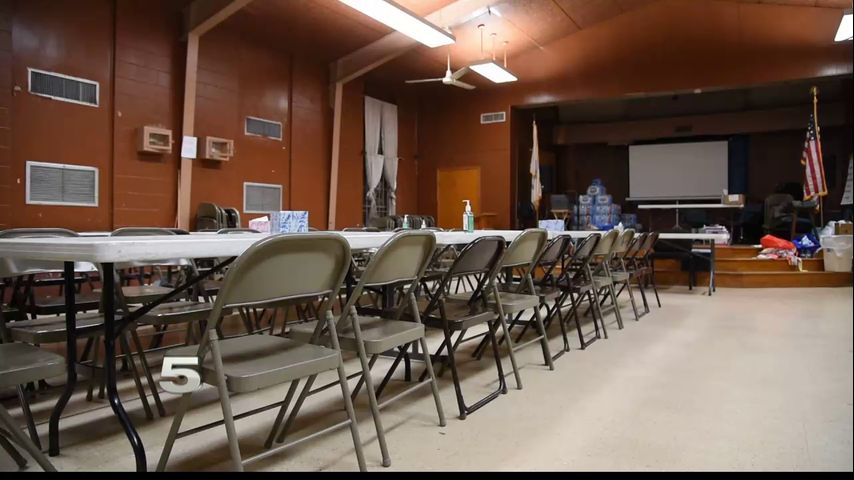24 Hours at an Immigrant Shelter: Adaptation to Challenges
BROWNSVILLE – Hundreds of immigrant families have been recently released at a newly-converted shelter in Brownsville.
Unlike in McAllen, Good Neighbor Settlement House had no formal system in place for accepting immigrants; that all changed last week.
A 24-hour stay at the shelter during the night they had the most people spend the night provided insight into how they're handling the challenges that come their way.
Grey skies, 50-degree weather and a slow, persistent drizzle washed over Brownsville Sunday morning.
By 7 a.m., Jack White is preoccupied with the task of unloading mountains of towels at the laundromat two blocks away from the Good Neighbor Settlement House.
He's not a volunteer; he's the director for the shelter that has traditionally focused on the underprivileged and homeless in the community.
The towels he and a volunteer are washing were used by a new group they recently started helping, immigrants recently released by Border Patrol.
They started helping immigrant adults dropped off at the Brownsville bus station over the summer.
The groups they started seeing a few days ago are comprised of different ages.
"We're now seeing young men, men with children, women with children, entire families, so the variety is interesting," said White.
Hundreds of immigrant families are now dropped directly at their door.
White and his team had little time to prepare.
White says they had heard it could happen days before the first group arrived, but it wasn't confirmed.
"We had about four hours in the end," White explains. "We kept being told, 'well, it's not going to happen here.' Until we heard that the buses were scheduled."
On Sunday morning, it's just another workday for White who forgot to bring a jacket.
A volunteer drapes one over his drenched shoulders before he heads to a nearby church.
He has a message he wants to share.
"At every opportunity, I like to see how can we share information so that people come away from the conversation understanding more, and able to embrace and be a partner with us," White says.
White is hoping to get more support from other churches who can temporarily shelter families, if the constant release continues.
After his trip to the church, he heads back to the shelter where a group of families is waiting to see a clinician.
They're seeking medical advise on a variety of cold-like symptoms and some stomachaches.
White meets with the man who opens the clinic.
These days, his job description could be summarized better as a troubleshooter. He says they're constantly improving how they help.
"But at every point where we thought we had a framework we could depend on, something external had changed so as to pull us into another learning curve."
It takes a team of staff and volunteers to register immigrant families, get them connected with family members across the country and explain where they are and where they're going.
In the middle of that process, city leaders show up.
The city of Brownsville is providing security and transportation, but they're there to announce things are changing.
Brownsville City Manager Noel Bernal explains, "We're now making Ozanam the primary, and Good Neighbor the secondary location."
He explains they have more space at Ozanam Center. They will send those with plane tickets there and those with bus tickets will continue arriving at Good Neighbor, which is close to the bus terminal downtown.
The number will now be split between the two shelters providing some relief for the team. That is set to start the following day.
In the meantime, the kitchen staff is busy.
Hotdogs are served for lunch. It's early in the afternoon, but the cooks are already making dinner - ground beef, vegetables and rice.
If they knew exactly how many people to expect, they could start later.
Since they don't, they mix in more vegetables and hope it covers the many yet to come. By 7 p.m., the dinner seems to be enough.
The night shift starts and the auditorium is transformed into a dormitory and makeshift theater.
Those staying longer than a night are taken to different spaces. More inevitably arrived.
Families were shuffled and extra beds were set up to accommodate a total of 164 people - the most they've seen spend the night up until that point.
By midnight, there's some snoring mixed with the sounds of movies playing throughout the night.
By 3 a.m., those with early flights are awakened. The rest are moved to a different part of the shelter.
Mattresses are cleared, floors are cleaned and tables are set up. The cycle starts again.
Jack White is back and ready. He knows the challenges go beyond dirty laundry, stretching out dinners, or finding enough sleeping space.
There are people who are not happy these immigrant families are getting help.
White says his approach is to invite people into his shelter and show them the process up close.
"If you haven't seen how much they need to shower and new shoes for their feet, if you haven't seen the smiles on their face when they're helped, the spark in their eyes when you connect eye to eye, you don't know," he says of those with opposing ideologies.
White laments, "And I haven't reached out enough."
Along with White, a local attorney shows up to the shelter Monday morning.
He's brought several large jars of peanut butter. It could make for a good snack to the many who are yet to arrive that day.
White continues to reach out for support from other community churches.
With some help from the American Red Cross, he's organized a training for churches interested in helping temporarily shelter immigrant families.
The training is set to begin Wednesday, April 3 at 1 p.m. through 4 p.m.
The training will take place at the First United Methodist Church on 1225 Boca Chica Blvd in Brownsville.





